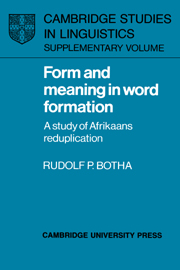Summary
Outline
To account for the formal properties of Afrikaans reduplications the theory to be developed below has to express the following generalization:
Afrikaans reduplications are words formed by the copying of words.
This generalization may be expressed by means of two hypotheses: the rule stated informally in (2)(a) – or less informally in (2)(b) – and the status specification in (3).
(a) Copy ∝
(b) ∝i → [∝i∝i]
(2) is a word formation rule
It will be argued below that, if the formation rule (2) is applied in conjunction with other, independently motivated rules of Afrikaans grammar and if, moreover, it is made subject to certain independently motivated general linguistic conditions, only a minimum of additional language-specific assumptions are needed to account for the formal properties of Afrikaans reduplications. Moreover, if word formation rules (or WFRs) are formally distinct from other formation rules, then (3) need not be stipulated as a separate claim in the grammar of Afrikaans.
The justification for the theory of the formation of Afrikaans reduplications to be presented in subsequent paragraphs has two basic components, each complementary to the other. On the one hand this theory has a highly desirable conceptual property: it provides insight into what appears to be a be wilderingly complex phenomenon by reducing its apparent complexity to a minimal number of hypotheses that are both simple and general. In achieving this reduction, the theory gains considerably in unifying power. On the other hand the theory has highly desirable empirical credentials: it implies correct consequences.
- Type
- Chapter
- Information
- Form and Meaning in Word FormationA Study of Afrikaans Reduplication, pp. 10 - 90Publisher: Cambridge University PressPrint publication year: 1988

